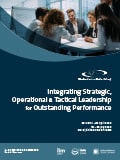An intensive professional development training course on
Planning, Managing and
Measuring Performance
using Spreadsheet Skills
Why Choose this Training Course?
The Structure
This comprehensive training course consists of two modules which can be booked as a 10 Day Training event, or as individual, 5 Day training courses.
Module 1 - Spreadsheet Skills for Planning, Forecasting & Budgeting
Module 2 - Effective Budgeting & Operational Cost Control
The Course Content
Module 1 - Spreadsheet Skills for Planning, Forecasting & Budgeting
Day One: Fundamentals of Business Planning
- The aims and principles of strategic planning
- A framework for effective strategic execution
- The structure and format of financial statements
- Measuring and managing financial performance
- Principles of financial modelling
- Spreadsheet skills: Excel best practice and modelling tips
Day Two: Principles and Techniques of Business Forecasting
- Spreadsheet skills: using Excel’s statistical analysis tools
- Using moving averages to analyse time series data
- Using linear regression for sales trend analysis
- Applying exponential smoothing to forecasting
- Spreadsheet skills: using Excel Solver to minimise forecasting error
- Avoiding common forecasting problems
- Data visualisation – presenting data to non-financial managers
Day Three: Budgeting for Revenue and Operating Costs
- The role of budgeting in the planning cycle
- Traditional and advanced approaches to cost analysis
- Spreadsheet skills: using regression and correlation for cost forecasts
- Criticisms and limitations of conventional budgeting methods
- Beyond Budgeting
- Spreadsheet skills: building rolling forecast models
Day Four: Cash Flow Forecasting and Cash Budgeting
- Understanding the drivers of business cash flow
- Spreadsheet skills: building a cash flow forecast model
- Principles of capital budgeting
- Capital investment appraisal tools
- Understanding discounted cash flow (DCF) analysis
- Spreadsheet skills: building a capital investment appraisal model
Day Five: Incorporating Risk Management in to Planning and Forecasting
- Identifying and analysing business risk
- Probability based approach to decision-making
- Spreadsheet skills: building decision trees in Excel
- Sensitivity analysis and “What-If” forecasting
- Identifying the key drivers of financial performance
- Spreadsheet skills: building a “What-If” forecast for sensitivity analysis
Module 2 - Effective Budgeting & Operational Cost Control
Day Six: Introduction: Building a Common Financial Language
- The key role of budgeting and cost control in contemporary organizations
- The 21st century business imperative: Delivering value added (but to whom?)
- Financial vs. Managerial accounting (for decision making)
- Understand your processes: Integrating financial and non-financial aspects
- The budgeting process
- Examples and Discussion
Day Seven: The Budgeting Process
- The key features of budgeting
- Advantages and concerns with budgeting
- Accountability and centers of responsibility
- Zero-based budgeting
- Budgeting and cost control
- Examples and Discussion
Day Eight: Cost Analysis
- Different costs for different purposes
- Fixed vs. Variable costs
- The Cost-Volume-Profit analysis model
- Contribution Margin analysis
- Examples and Discussion
Day Nine: Traditional vs. Advanced Techniques in Cost-Control
- Under-costing and over-costing: The consequences for profitability
- Indirect (OH) vs. Direct costs
- Traditional Cost Allocations systems vs. Activity-Based Costing (ABC)
- Linking resources, activities and management
- Variance analysis
- Video, Case Study and Examples
Day Ten: Beyond the Budgets: Balanced scorecards and Six-sigma
- Broadening performance measurement systems
- Beyond budgeting: Integrating financial and non-financial issues
- Introducing the Balanced Scorecard
- Introducing the Strategy maps
- Introducing Six-sigma
- Video, Case Study and examples
The Certificate
- AZTech Certificate of Completion for delegates who attend and complete the training course
DO YOU WANT TOLEARN MORE ABOUT THIS COURSE?
© 2024. Material published by AZTech shown here is copyrighted. All rights reserved. Any unauthorized copying, distribution, use, dissemination, downloading, storing (in any medium), transmission, reproduction or reliance in whole or any part of this course outline is prohibited and will constitute an infringement of copyright.







